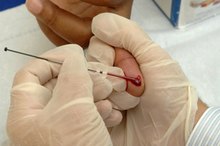Running After Giving Blood
When you give blood, you are saving lives. According to the American Red Cross, every two seconds someone in America needs blood and 38,000 blood donations are needed daily. Evidence also suggests giving blood may improve your own cardiovascular health. However, don't do strenuous physical activity like running immediately after you give blood. Give yourself time to recover before you run so you don't feel lightheaded or dizzy. Always follow the instructions provided at the facility where you gave blood.
Following Donation
Following your donation, the American Red Cross advises against lifting heavy objects or doing strenuous physical activity for five hours. Obviously you want to postpone running immediately after giving blood as the exercise is considered a strenuous physical activity. You also need to avoid doing any other type of workout that involves lifting heavy objects or doing a strenuous type of activity. You can resume your running regimen after you rest for the mandatory period of time and enhance your recovery.
- Following your donation, the American Red Cross advises against lifting heavy objects or doing strenuous physical activity for five hours.
- Obviously you want to postpone running immediately after giving blood as the exercise is considered a strenuous physical activity.
Enhancing Recovery
Is It Safe to Donate Blood While Breastfeeding?
Learn More
When you are recovering from giving blood, you can do a few things in addition to waiting five hours to enhance your recovery so you can get back to running. Make sure you drink plenty of fluids in the 24 to 48 hours after your donation. Try to eliminate caffeinated and alcoholic beverages so you are well hydrated. Also eat a complete meal before engaging in any type of exercise. Eat plenty of carbohydrates and lean proteins to replenish your energy level and to replace essential vitamins and minerals.
- When you are recovering from giving blood, you can do a few things in addition to waiting five hours to enhance your recovery so you can get back to running.
- Make sure you drink plenty of fluids in the 24 to 48 hours after your donation.
Safety Tips
The best way to avoid feeling lightheaded and dizzy when you run after giving blood is to follow the recommended recovery guidelines. If you feel dizzy during your run stop, lie down and elevate your feet. The most important safety tips are not to engage in physical activity at all if you feel lightheaded or low on energy, and stop running immediately if you feel dizzy to avoid a fall. If you don't feel right despite following recovery recommendations, contact the donation facility or your doctor.
- The best way to avoid feeling lightheaded and dizzy when you run after giving blood is to follow the recommended recovery guidelines.
- The most important safety tips are not to engage in physical activity at all if you feel lightheaded or low on energy, and stop running immediately if you feel dizzy to avoid a fall.
Health Benefits
Smoking Before Donating Blood
Learn More
Running is a physical activity that decreases your risk for heart disease and improves your cardiovascular health. According to Florida Blood Services, giving blood may also decrease your risk of heart disease. Reasons for this may be that artery destroying iron is removed from your blood and the mandatory physical exam prior to donation helps to identify cardiovascular issues such as high blood pressure.
Related Articles
References
- American Red Cross: Tips for a Successful Donation
- Florida Blood Services: Giving Blood Regularly Provides Health Benefits
- Just SA, Rostgaard K, Titlestad K, et al. Transmission of rheumatoid arthritis through blood transfusion: a retrospective cohort study. Ann Rheum Dis. 2018;77(10):1536-1537. doi:10.1136/annrheumdis-2017-212844
- American Red Cross. Frequently asked questions.
- Memorial Sloan Kettering Cancer Center. Medical conditions affecting donation.
- American Red Cross. Frequently asked questions: General health considerations.
- Mayo Clinic. Rheumatoid arthritis. Updated March 1, 2019.
- American Red Cross. Frequently asked questions: Medications and vaccinations.
- The National Institute of Diabetes and Digestive and Kidney Diseases. Anemia of inflammation or chronic disease. Updated September 2018.
- Mayo Clinic. Blood donation.
- American Red Cross. Frequently asked questions about iron and blood donation.
- American Red Cross. Eligibility requirements.
- U.S. Department of Health & Human Services. Revised recommendations for reducing the risk of human immunodeficiency virus transmission by blood and blood products. Updated April 2020.
Writer Bio
Jackie Carmichael has been a freelance writer for more than 10 years. Her work has appeared in "Woman's World" and "American Baby" magazines. Carmichael is a licensed registered nurse and has worked in fields related to cardiovascular health and psychiatry. She also holds a Bachelor of Arts in journalism from The Ohio State University.







